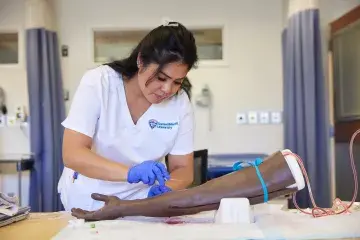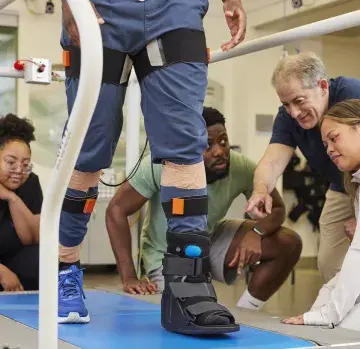4 Changes That Would Make Nursing Curriculum More Socially Conscious
Student Voices is a blog series written by SMU students. If you have an idea for a story, reach out to ssolo@samuelmerritt.edu. This article is written by Vay Hoang, an ELMSN-FNP student.
What does nursing mean to you? What do you feel is important to include in your nursing school education? These questions were the prompts that guided me to write this blog.
As a future nurse, I will be a patient advocate and healer. Within my scope of practice in the health care setting, I assess, provide care and comfort, treat, and advocate for my patients. Outside of the health care setting, I continue to advocate for my patients, peers, and community by pushing for policy changes that benefit my community, and education.
Under the current political climate, it is more important that we are educated and proactive as health providers to advocate and defend our patients, our colleagues, and our community. It pains me to see politicians applaud and celebrate the passage of laws that would strip away health care for millions and make it even harder for so many more to access.
Attacks against the transgender and queer community, immigrant community, and communities of color are still present and on the rise in many places. As future health providers, it’s our duty to ensure the health and safety of our patients, both through prevention and medical intervention. To properly serve our patients, we need to understand them holistically.
1. Social Consciousness Infused Curriculum
As future health providers, it’s crucial that we understand the patients that we’re working with. The Bay Area is home to vibrantly diverse communities and it’s critical that we are knowledgeable about our patients’ cultural backgrounds, environments, and the social, emotional, and political climates they live in. A baseline knowledge around gender (the spectrum, preferences, pronouns, etc.) needs to be learned in order for us to respect out patient’s identity and provide compassionate care. There are many organizations based here in Oakland, such as Planned Parenthood, the School of Unity & Liberation, or Causa Justa Just Cause that can provide trainings and workshops to help develop that baseline knowledge. The Bay Area has a huge gap between economic classes. With gentrification in effect in the bay area, long-term residents and many working class are being displaced due to the increasing cost of living. We need to understand the conditions of our patient population because they have effects on our patients' health and well-being. This will help us be informed and compassionate health providers.
2. Meaningful Clinical Placements
One of my best experiences at SMU has been my clinical placement at the Native American Health Center in East Oakland and Transexcellence Clinic at Brighter Beginnings in Richmond. As a future FNP, nothing has prepared me better than treating patients across the class/ethic/race/wealth/poverty/gender spectrums. These experiences put me in the heart of a marginalized communities and asked me, as their healthcare provider, to see the entirety of the patient’s circumstance rather than just their symptom(s). For example, I saw firsthand that a transgender patient who has comorbidities (such as diabetes, hypertension, hyperlipidemia, etc.), in addition to dealing with immigration and domestic violence needs compassion and knowledge in multiple sectors. We learn from interacting with real patients that life is often far from a textbook. These kinds of clinical experiences are meaningful, and lasting, and can inspire healthcare students to become advocates for community members.
3. Patient Advocacy, Community Involvement, and Policy Change
As nursing students learning about the health field, now is the ideal time to expose us to various community issues, such as how to be a patient advocate in and out of the hospital/clinic, and how to push for policy change. Regardless of how we may feel about politics and health, whether we’re apolitical or following every move of our legislatures, politics matter and will impact our practice and our patients (e.g. Affordable Care Act, AB1306, etc.). The ELMSN FNP (Entry Level Masters Of School In Nursing – Family Nurse Practitioner) had an amazing course dedicated to Policy (Analysis of Health Policy Issues) and this should be a course taken by all students and its contents should incorporated into curriculum of more courses.
4. Community Building & Compassion
A major reason I entered nursing is because of the aspects of care. It’s what I expect of myself and what our patients desire from us. In order to foster “feelings” of care, we need to promote care through community building and compassion with each other on our journey to become professionals.
All of my fellow students are caring and compassionate — that’s why we’re dedicating our lives to healthcare. But I would like to see more exploration on what it means to be a compassionate healthcare provider, aware of the assumptions we bring into our care. How can we provide care without naively asking shaming questions? How can we slow down and listen to our patients rather than hunt for symptoms?
Nursing is one of the most trusted professions. But we have a greater opportunity, through truly compassionate care, to build trust with countless individuals and entire communities. If we can have those discussions here on campus, we might be better prepared to have them in clinics after we graduate.
SMU is based in one of the most vibrant, unique, and socially conscious cities in the nation. It’s part of why I chose this school. I think more of Oakland’s complexity should be embedded into the curriculum, and it’d leave us all better prepared to help reduce health disparities in the future.
This, hopefully, is that start of a conversation that we will continue to have, with positive changes to arise.


